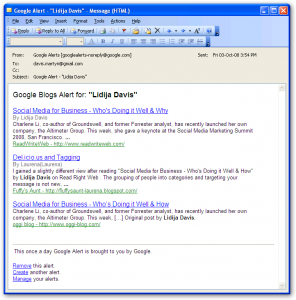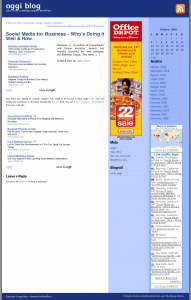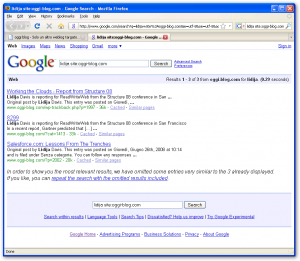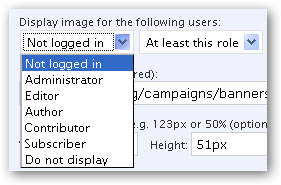<rant>
Let me tell you a story…
Lid does a number of things around the Web, and sometimes I even find it hard to keep up. So I have a Google alert on her, so I can see what she is doing and what people are saying about her. That’s my excuse anyways.
Last Friday I got an alert from Google with 3 references:

The references are:
- Lid’s ReadWriteWeb post about
Social Media and who is doing it well from the Social Media Marketing Summit in San Francisco.
- A
post by Laurena about delicious and tagging which discusses and references Lid’s article -just what the Web is intended for.
- A post by ‘Oggi’ which looks remarkable like Lid’s - it starts with the same 20 words - and even references her by name.
So who or what is Oggi’s blog? Here is a screen shot.

Here is a breakdown of Oggi’s blog:
- 3 separate groups of Google advertising - two text based, and the third image based.
- The title of the post which is the same as Lid’s.
- The content of the post is the same initial 20 words of Lid’s post, then followed by “Original post by Lidija Davis” with Lid’s name linked to her post on ReadWriteWeb.
Now the link on Lid’s post is interesting in that it is not a direct link to the post on ReadWriteWeb, but rather an indirect link via Google’s FeedBurner service. Here is the link:
http://feedproxy.google.com/~r/readwriteweb/~3/nS1e6RgCjbw/social_media_for_business_who_is_doing_it.php
So what about the other posts on this blog? Surprise, surprise, they all reference other people’s posts in exactly the same way. The same title is used, same first 20 words, and a link to the original post via FeedBurner.
Just to prove to myself that Google is still in fact indexing Oggi’s blog, I did a site search for Lidija, and found two previous ReadWriteWeb posts.

So what is the point of Oggi’s blog?
To hi-hack anyone who is searching for the title of noteworthy posts, so that if they click on the links, they will invoke 3 separate Google blocks of ads, with the user clicking through to the original article.
Now, who wins out of this?
- Oggi - for the princely sum of a few fractions of a cent.
- Google - for recording and charging the lucky advertisers for appearing on Oggi’s blog - this too would be minimal; however, it is still money on the bottom line.
The individual amount of money changing hands is minimal; however, multiply this by the number of hapless visitors and it could get into the hundreds for Oggi, and multiply this by the number of Oggi clones out there and now you are getting into the thousands for Google. I must state that I have absolutely no clue as to the actual numbers, but I think I have underestimated both sets of numbers here.
So who loses?
- The users of the Web for being distracted by useless profiteering …
- The advertiser.
- The Web in general for being littered with content which has absolutely zero value.
So to recap:
- I was sent an e-mail by Google alerting me to the existence of Oggi’s blog, of which I was blissfully ignorant until then.
- I visit Oggi’s blog and find that I am reading a post of zero value to me, has zero content, well actually 29 words copied from elsewhere, and which is surrounded by 3 block’s of Google advertisements.
- The link to the original post is via Google’s FeedBurner service.
The only thing which is not Google’s is the blogging software, which is WordPress in this case. Otherwise, we would have had a clean sweep. Digressing a bit, we had a bit of
fun last April fool’s with this post on Google acquiring WordPress (remember this is not serious).
Now what Oggi is doing is cookie cutter stuff, so I can’t see how Google cannot detect that the intent is none other than injecting a post in between the user and what they actually want to view and benefiting courtesy of Google ads.
But then the conspiracy person within me has a theory, and we all have one, just the degree varies (checkout ReadWriteWeb’s very own post on
Chrome)…
Why aren’t Google proactively purging such sites from their index, and thus alerts?
If they did then they loose money since ads are not being triggered.
I certainly hope this is not the case. I would expect that purging 100% of such sites from the index is actually impossible, but I think that low hanging fruit such as Oggi are simple enough for a group of 2-3 Googlers to solve - a few, ok, many, 20% days perhaps.
It maybe a long bow, but the theoretical dilemma is interesting, and no doubt finer minds than mine have discussed this to death.
I googled Google to see if you can report such blogs so this site is removed from the index, but the only thing I could find on the first page of the results, I am not a patient searcher, was a reference to reporting copyright infringements which requires me to mail in a letter (I kid you not).
I was expecting to find a ‘report abuse’ link one click away from the Google’s home page, in “About Google” specifically.
With search being an integral part of everyone’s online life now, and that given that ‘googled’ is now a verb, it plays a critical component of the Web, in that it potentially can control the pages which are viewed by users, thereby controlling the ads which are displayed, thereby controlling the potential revenue received by Google.
Google currently receives a lot of freedom in what they do, which they have rightly earned, but how can we be sure that this is not abused in the future?
How can we, the citizens of the Web, be assured that there is no conflict of interest between the search/index side of the business and the advertising side within Google?
Is there a common theme here? Checkout
Michael Gray’s view on Google’s book search.
</rant>
Sphere: Related Content


 Add to Delicious
Add to Delicious Digg This!
Digg This! Stumble This!
Stumble This! Mixx This!
Mixx This! Sphinn This!
Sphinn This!










 Add to Technorati
Add to Technorati
